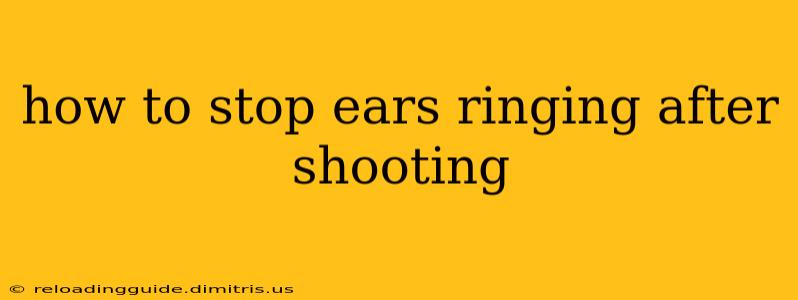Experiencing ringing in your ears (tinnitus) after shooting can be alarming and uncomfortable. This comprehensive guide explores the causes of shooting-induced tinnitus, effective strategies for managing the ringing, and crucial preventative measures to protect your hearing.
Understanding Shooting-Induced Tinnitus
The loud sounds produced by firearms, even with hearing protection, can cause temporary or even permanent hearing damage, leading to tinnitus. The intensity and duration of exposure directly impact the severity of the ringing. While some ringing might subside quickly, persistent tinnitus requires immediate attention.
Causes of Tinnitus After Shooting:
- High-intensity noise exposure: The most common cause. Gunshots generate incredibly loud sounds that can overwhelm the delicate structures of the inner ear.
- Improper hearing protection: Inadequate earplugs or muffs, or incorrect usage, significantly increases the risk of hearing damage and tinnitus.
- Multiple exposures: Repeated exposure to gunfire, even with hearing protection, cumulatively damages hearing and increases the likelihood of developing tinnitus.
- Underlying hearing conditions: Pre-existing hearing problems can exacerbate the effects of noise exposure from shooting.
Managing Ringing in the Ears After Shooting:
Immediate action can significantly reduce the duration and severity of tinnitus.
Immediate Actions:
- Move to a quieter environment: Reduce further noise exposure to allow your ears to recover.
- Hydrate: Drink plenty of water to support inner ear health.
- Avoid caffeine and alcohol: These substances can potentially worsen tinnitus symptoms.
- Rest: Allow your body to rest and recover.
Long-Term Management:
If the ringing persists for more than a few hours or days, consult an audiologist or ENT specialist. They can perform a thorough hearing evaluation and determine the extent of the damage. Treatment options may include:
- Sound therapy: White noise, nature sounds, or customized sounds can help mask the tinnitus.
- Cognitive-behavioral therapy (CBT): CBT helps manage the psychological impact of tinnitus by changing negative thought patterns and coping mechanisms.
- Tinnitus retraining therapy (TRT): This therapy focuses on retraining your brain to reduce the awareness of tinnitus.
- Medication: In some cases, medication might be prescribed to address underlying conditions contributing to tinnitus.
Preventing Shooting-Induced Tinnitus:
Prevention is always better than cure. These measures significantly reduce your risk of developing tinnitus from shooting:
Essential Preventative Measures:
- Always wear hearing protection: Use high-quality earplugs or muffs rated for firearm noise reduction (NRR). Ensure a proper fit to maximize protection.
- Choose the right hearing protection: Consider double hearing protection (earplugs and muffs) for maximum noise reduction in particularly loud environments.
- Take breaks: Regular breaks during extended shooting sessions allow your ears to recover from noise exposure.
- Limit exposure: Reduce the frequency and duration of shooting sessions to minimize cumulative noise damage.
- Regular hearing check-ups: Annual hearing tests, especially for regular shooters, are crucial for early detection and management of hearing problems.
Conclusion:
While tinnitus after shooting can be concerning, understanding the causes, implementing effective management strategies, and prioritizing prevention are crucial steps in protecting your hearing. Remember that seeking professional medical advice for persistent tinnitus is vital for appropriate diagnosis and treatment. Your hearing health is invaluable—take proactive measures to safeguard it.

